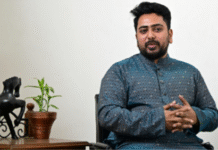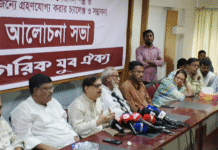Manik Miazee
According to several reputed confidential sources, Jamaat is eyeing 40 constituencies to contest in the 2019 general elections
After nearly four years of lingering in political limbo, Bangladesh Jamaat-e-Islami is showing it is actively engaging people in the grassroots level, without drawing undue attention.
In 2013, a Supreme Court verdict cancelled the registration of the party with the Election Commission, preventing it from taking part in any elections. Another Supreme Court decision in 2016 to remove “weighing scales” as an electoral symbol seemed to be yet another nail in the coffin for Jamaat.
But despite the apparent absence from Bangladeshi politics, Jamaat has been working around the clock to prepare for the 2019 elections.
Even before the party institution was deconstructed, the top brass were being indicted from 2011 for their war crimes during the 1971 Liberation War. In response to the loss of major leaders, the controversial party has been bringing in new blood and fresh faces.
It was widely believed that Jamaat would appeal to overturn the Supreme Court’s decision to restrict their election participation. The case now rests with the Appellate Division, and until recently this had appeared to be Jamaat’s key to get back into the game.
Old play, new actors
But a number of Jamaat leaders, a mix of veterans who survived the judicial action and new recruits, say that the party will sit for the election by any means necessary.
Since 2016, the main focus of Jamaat has been to rebuild its target demographic from the grassroots. Rural areas, border areas, areas which have experienced severe crackdown by law enforcement agencies are the key voter mines for Jamaat to tap.
Jamaat seems to be focusing on the northern and coastal districts for its revival.
Families which have lost a member to engagement with police or RAB are singled out. Jamaat members are building up rapport on empathy. Financially marginalised families are supported with job opportunities or welfare if they join the party.
Highly-trained Jamaat members (Rokon), numbering in the thousands, go from door to door, engaging people one-on-one to sway their votes. Mosques see regular sermons by these rokons. Party funds are on the rise with donations from patrons and registered members.

Championing the Comilla mayoral elections
The restructuring and maneuvering of Jamaat-e-Islami was palpable, but not visible, in the Comilla City Corporation election earlier this month. Thousands of rokons from Noakhali, Lakshmipur, Feni and Chittagong formed the core of their political campaign, laying the groundwork for the 20-party Alliance victory. With additional low-key support of its student-wing Islami Chhatra Shibir, four Jamaat-affiliated councillors emerged victorious out of the five seats they campaigned for.
BNP-backed Monirul Haque Sakku retained his mayoralty with heavy support from Jamaat and its wing organisations. Several Jamaat leaders told the Dhaka Tribune it considered the 2017 Comilla City Corporation election a proving ground of their restructuring, a test they believe to have passed exceptionally well.
Comilla is considered fertile for the new Jamaat, and there is reason enough for this. Syeed Abdullah Muhammad Taher, a member of the current Executive Committee of Jamaat and former president of the central committee of Chhatra Shibir and a former MP, is a Chauddagram native.
After the election results sounded the victory for the BNP-led 20-party Alliance, Taher congratulated Gulam Kibria, Mosharraf Hossain, Iqramul Haque Babu and Siddiqur Rahman Suruj from wards 1, 6, 8 and 20 respectively on a Facebook post on March 30.
In his post, Taher praised the decision of the nominees to campaign under a different symbol, which signified the party had made its peace with losing the “scales.”
A more fervent Facebook post by Rezaul Karim, member of Jamaat central working committee and another former president of central Chhatra Shibir, hailed the victory as a divine blessing from Allah.
“It is the victory of the people against the misrule of Awami league. Allah himself assured the respect of the tears of the oppressed and the blood of the martyrs. The victors must pay gratitude to the Almighty. Evident in the history that none can sustain their power only by means of oppression and suppression, the oppressor must suffer the defeat in the consequence.”
‘Quran does not change, our charter does’
The Jamaat revamp has seen three key changes in its charters. Their first national conference is in the works, the elections for the 23-member executive body, 53-member working committee, 277-member central Majlish-e-Sura body have been completed by March 2017, and there are new chiefs from the party’s helm to the wards.
The party aims to see at least 33% of its members be women by 2020.
The ameers for Dhaka South and Dhaka North units are all fresh faces, but tried and tested during their tenure as Shibir president.
Jamaat and Shibir are using online platforms to expand their reach. A source said they are afraid of using cellular connections as it can be traced back and monitored by the police. Rather, Viber, Skype, Facebook, Line, Imo, and other web-based communication platforms have become their Suhrawardy Udyan.
In addition, thousands of Facebook pages are active around the clock. Each unit has its own Facebook page, giving them a unique identity and an umbrella at the same time.
A Jamaat leader commented: “Our charter is not absolute, the Quran does not change, but our charter adapts with time and age.”
Target 2019
According to several reputed confidential sources, Jamaat is eyeing 40 constituencies to contest in the 2019 general elections.
The party has contingencies for its contingencies. If the court does not allow Jamaat to take part in the elections as a party, the candidates will declare themselves independent to continue moving forward.
Jamaat sources stated their current focus is on doing inventory, assessing future costs, estimating the logistics required, and how much show of force will be needed to bring Jamaat back into the spotlight, without the tarnished reputation of war crimes billowing in their wake.
Source: Dhaka Tribune










